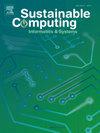Integrating IoT and fuzzy logic for intelligent irrigation in sustainable agriculture for improving water scarcity: Benefits and challenges
IF 5.7
3区 计算机科学
Q1 COMPUTER SCIENCE, HARDWARE & ARCHITECTURE
引用次数: 0
Abstract
Modern agriculture faces significant challenges related to water scarcity and the impacts of climate change. To ensure crop sustainability and food security, irrigation systems must be optimized. Fuzzy logic and the Internet of Things (IoT) are two cutting-edge approaches to intelligent irrigation management that adjust water delivery to plants' real needs. Conventional irrigation techniques are wasteful and ineffective. Fuzzy logic and the IoT have exciting opportunities, but integrating them presents difficulties, especially (1) concerning implementation, (2) cost, and (3) data security. In light of water shortage, food security, and sustainable development issues, this proposed article examines how IoT and fuzzy logic might be used to create smart irrigation systems. It evaluates contemporary methods for optimizing water management using fuzzy logic and the IoT, as well as the effects of climate change on irrigation. While addressing the challenges of installation costs, implementation complexity, communication reliability, and data security, the proposed review highlights the benefits of these technologies, including reduced water consumption, increased agricultural yields, automation, and environmental adaptability. The main topics of this review's final section, including the integration of new, cutting-edge technology, enhanced decision-making models, and the adoption of sustainable solutions for more resilient and effective agriculture, also address potential directions for future research. importance of the research. Due to water constraints and climate change, this study highlights the importance of intelligent irrigation systems. It showcases creative methods to maximize water management and raise agricultural productivity by fusing IoT with fuzzy logic.
将物联网和模糊逻辑集成到可持续农业智能灌溉中,改善水资源短缺:收益与挑战
现代农业面临着与水资源短缺和气候变化影响有关的重大挑战。为了确保作物的可持续性和粮食安全,必须优化灌溉系统。模糊逻辑和物联网(IoT)是智能灌溉管理的两种前沿方法,可以根据植物的实际需求调整供水。传统的灌溉技术既浪费又无效。模糊逻辑和物联网有令人兴奋的机会,但整合它们存在困难,特别是(1)关于实施,(2)成本和(3)数据安全。鉴于水资源短缺、粮食安全和可持续发展问题,本文探讨了如何使用物联网和模糊逻辑来创建智能灌溉系统。它评估了利用模糊逻辑和物联网优化水管理的当代方法,以及气候变化对灌溉的影响。在解决安装成本、实施复杂性、通信可靠性和数据安全性等挑战的同时,拟议的审查强调了这些技术的好处,包括减少用水量、提高农业产量、自动化和环境适应性。本综述最后一部分的主要主题,包括整合新的尖端技术,增强决策模型,以及采用可持续解决方案以提高农业的抗灾能力和效率,也讨论了未来研究的潜在方向。研究的重要性。由于水资源限制和气候变化,本研究强调了智能灌溉系统的重要性。通过物联网和模糊逻辑的融合,展示了最大化水资源管理和提高农业生产力的创新方法。
本文章由计算机程序翻译,如有差异,请以英文原文为准。
求助全文
约1分钟内获得全文
求助全文
来源期刊

Sustainable Computing-Informatics & Systems
COMPUTER SCIENCE, HARDWARE & ARCHITECTUREC-COMPUTER SCIENCE, INFORMATION SYSTEMS
CiteScore
10.70
自引率
4.40%
发文量
142
期刊介绍:
Sustainable computing is a rapidly expanding research area spanning the fields of computer science and engineering, electrical engineering as well as other engineering disciplines. The aim of Sustainable Computing: Informatics and Systems (SUSCOM) is to publish the myriad research findings related to energy-aware and thermal-aware management of computing resource. Equally important is a spectrum of related research issues such as applications of computing that can have ecological and societal impacts. SUSCOM publishes original and timely research papers and survey articles in current areas of power, energy, temperature, and environment related research areas of current importance to readers. SUSCOM has an editorial board comprising prominent researchers from around the world and selects competitively evaluated peer-reviewed papers.
 求助内容:
求助内容: 应助结果提醒方式:
应助结果提醒方式:


